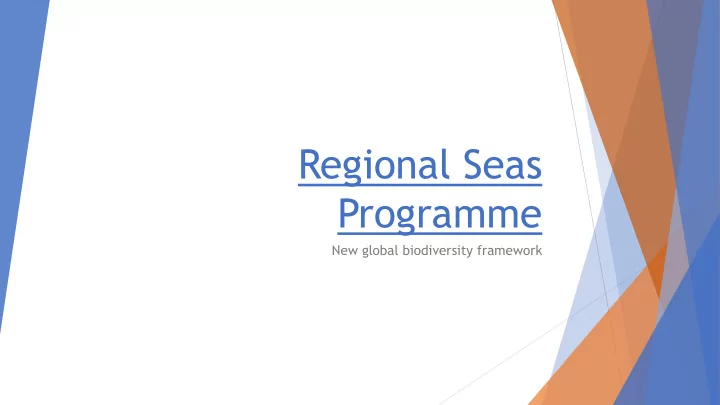

Regional Seas Programme New global biodiversity framework
Presentation’s objective Outline how the mission and goals of the Regional Seas Programme could be integrated into the new global biodiversity framework .
History The Regional Seas Programme, launched in 1974, after the establishment of UNEP has continued to grow to become one of UNEP’s significant achievements and a global flagship programme implemented through regional frameworks for cooperative management and protection of shared marine and coastal environment.
Aim The Regional Seas Programme was set-up to address accelerating environmental degradation of the world’s shared marine and coastal areas including management of the natural resources through concerted and comprehensive actions among neighboring countries sharing a specific body of a sea or ocean.
Regional Seas around Europe The North Sea The North-East Atlantic Ocean (OSPAR) Baltic Sea (HELCOM) Caspian Sea (Tehran Convention) Black Sea (Bucharest Convention) Mediterranean Sea (Barcelona Convention/UNEP MAP)
Key priorities of the Regional Seas programme Promote and facilitate ratification, adoption and implementation of Regional Seas Conventions, Action Plans and Protocols, working in concert with other Regional Seas Organizations Strategically work in collaboration with international and regional organizations, including Multilateral Environmental Agreements (MEAs), Regional Fisheries Management Organizations (RFMOs) and other relevant stakeholders.
Main Elements Monitoring Marine pollution Sustainable use of marine and coastal recourses Marine protected area
Monitoring Methodologies for monitoring Access to national data and information that could be used to support monitoring and reporting at national and regional level Reporting the status of various ecosystems in their regions Development of various guidelines
Marine pollution Sea-Based source of Land-Based source of pollution pollution Vessels Marine litter Oil Platforms Wastewater Fishing Nutrient management Ballast water
Sustainable use of marine and coastal recourses Towards Living in Harmony with Nature Economic assessment of the marine ecosystem services Promotion of the sustainable growth using the Blue Economy principles Fishery (Aquaculture) Maritime and costal tourism Maritime Transport Offshore wind power Integrated Costal Zone management and Marine spatial planning
Marine protected area Effective management of already Establishment of new Marine Marine Protected Areas (MPAs) and Protected Areas taking into attention other effective area-based the Ecologically and Biologically conservation measures (OECMs) Significant Marine Areas
Regional Seas Programme Aichi targets Lessons learnt
Regional voluntary commitments
Platform for Capacity Building
Recommend
More recommend